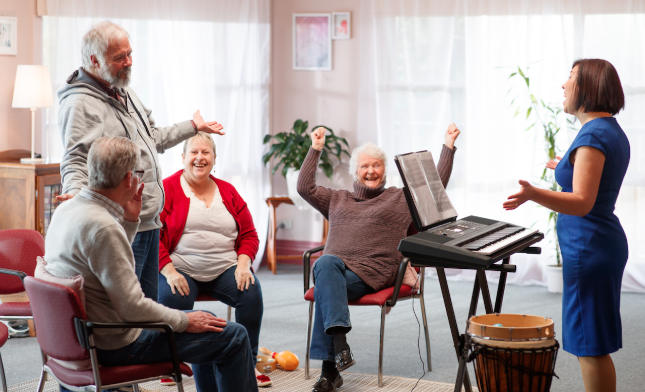
What is music therapy?
Music therapy is much like many other alternative therapies that aim to help improve physical, mental, and emotional wellbeing through interaction and engagement. In this type of therapy, music is used to help residents communicate, express their feelings and feel more relaxed.
Music therapy is beneficial for people with a wide range of health concerns. It is commonly used to assist people with dementia and brain injuries.
How music therapy in aged care being used?
Music therapy plays a very important role in the care of older people. In fact, there are over 400 registered music therapists in Australia that currently work in the aged care facilities.
There are many different aged care homes that currently have music therapy programs as part of their regular group activities. How these music programmes are run differ between aged care facilities, but all have the same goal – to improve the wellbeing of their residents.
Some music therapy programs involve listening to live music and making music requests. Others involve actually making music and improvising. It is common to find residents singing together and enjoying music that reminds them of yesteryear. Music therapy programs can also include the input and interaction of family members, where a resident’s family can compile a list of songs that they know have a meaning to their loved one.
Benefits of music therapy
Music therapy can be both active and passive. Regardless of the approach, research shows that music therapy has both emotional and physical benefits for the elderly. Music not only has a positive effect on motor skills, it can also improve social, psychological, intellectual and cognitive performance. These cognitive benefits prove especially beneficial for the management of dementia diseases such as Alzheimer’s.
- Reduced stress
- Improved healing
- Improved self-expression and communication
- Improved mood
- Improved sensory skills
- Alleviate symptoms of depression and anxiety
- Increases feelings of calmness
How can music therapy help people living with dementia?
Dementia affects brain function. It is well known that music has the ability to stimulate senses and awaken parts of our brain. It is because of this that music therapy can help people with dementia and has become a very well-researched area of study.
Professor Felicity Baker, the Head of Music Therapy at the University of Melbourne, summarised how music therapy can help those living with dementia.
“When you hear a piece of music and then the memories become evoked as a result of that, the neural network is activated, and it also then leads to the activation of more positive moods,” she says.
Studies investigating the links between music therapy and Dementia are still on-going, but are having promising outcomes and results.
Aged care can be complicated but the job of the Aged Care Experts here at Aged Care Decisions is to make the process of placing a loved one into aged care less stressful and more streamlined.
To discuss how we can assist give our team a call on 1300 775 870 or fill in this form and we will give you a call when it suits you.






